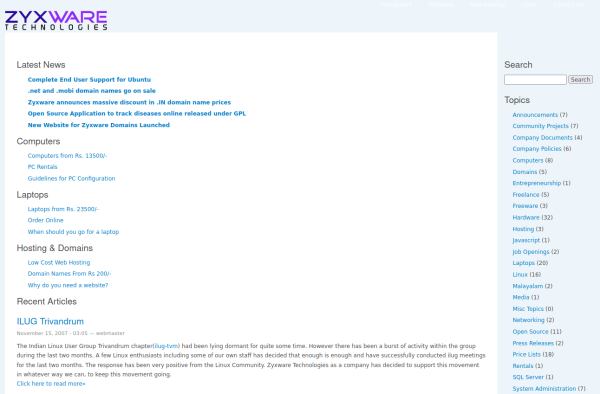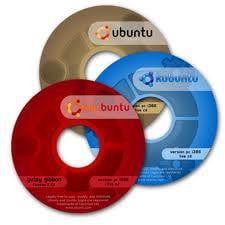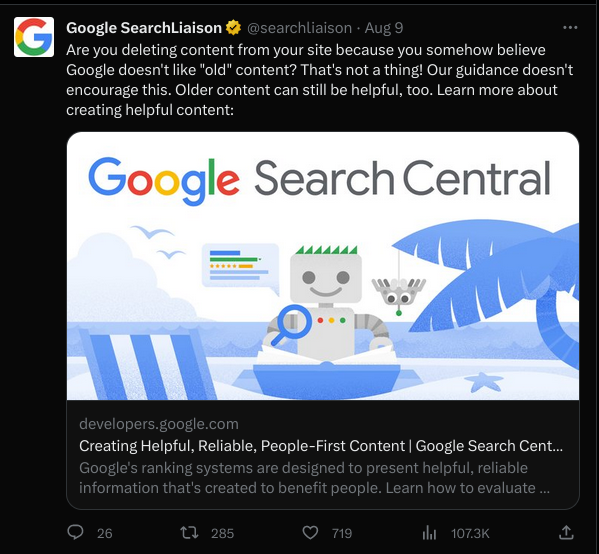Debunking the Myth: Does Google Really Penalize Old Content?
Our website (www.zyxware.com) was launched in 2006; since then, we've published over 5700 pieces of content. Many contents we created in the early stages of our business historically have value but may not be relevant in the current context. A good example is the content related to the Request CD program and hardware pricing-related content.

A Journey Through Time

Right from our inception, we were deeply involved with Free Software communities. One of our standout initiatives from that era was the "Request A CD" program. It was a time when bandwidth was a luxury, and many lacked internet access, so we decided to start the Request A CD initiative to do our small part to address the gap. Through this program, individuals worldwide could request a CD/DVD containing their favorite GNU/Linux distributions, and we would ship it to them at a minimal cost, just enough to cover our expenses. This program gained significant traction, leading to thousands of requests for various GNU/Linux distributions. Concurrently, we were also active in the hardware business, which led to lots of content related to GNU/Linux distributions, hardware comparisons, and price lists.
Tracking Traffic to Old Content
Recently, during discussions about potential changes to our website, the topic of whether to retain our old content came up. To make an informed decision, we implemented a tracking mechanism to assess the value of our legacy content in terms of current web traffic. The results were enlightening. A notable portion of our site's traffic was driven by content we'd published years ago. Additionally, the backlinks we generated from that content played an important role in boosting our current search engine position and ranking.

Given this data-driven analysis, we opted to keep our old content, a decision we haven't regretted. Validating our choice was a recent tweet from Google Search Liaison Danny Sullivan.
The Myth of Deleting Old Content

Are you deleting content from your site because you somehow believe Google doesn't like 'old' content? That's not a thing! Our guidance doesn't encourage this. Older content can still be helpful, too.
Danny further says in his tweet
The page itself isn’t likely to rank well. Removing it might mean if you have a massive site that we’re better able to crawl other content on the site. But it doesn’t mean we go “oh, now the whole site is so much better” because of what happens with an individual page.
and
We're not adding up all the "old" pages on a site and deciding a site is so "old" that other pages shouldn't rank well.Media widget. Press Enter to type after or press Shift + Enter to type before the widget
This emphasizes that Google doesn't discriminate against content based on its age. In fact, well-aged content that has been around for a while and has garnered trust and authority can prove beneficial for SEO. It stands as a testament to a site’s longevity and reliability.
When Should You Consider Deleting Old Content?
While the general consensus leans towards retaining old content, there are specific instances where it might be beneficial to remove or update pieces:
- Irrelevance or Inaccuracy: The content could misinform users if it is no longer accurate or relevant. In these cases, you should take the required action and decide to update or remove the content.
- Low-Quality Content: Pages with thin content, or those which don’t meet the current standards of quality should enhanced or removed/merged with other content as required.
- Duplicate Content: Multiple pages with the same information can confuse users and search engines. This is a good use case for making a decision to remove content from the website.
- Content that Doesn't Align with Branding: Over time, brands evolve. Consider updating the content if old content doesn't reflect current brand values or messaging.
If you ever have to delete any content, you should set proper redirects so that older links properly redirect to relevant content or use modules like Search404 (in Drupal), which does a search on the websites by extracting the keywords from the URL if a page is not found on the website. So the visitor gets relevant results even if they reach a page that does not exist on the website. Think of the end-user experience whenever you make changes to your website.
Note: If you have a large content website - a media portal or any website with lots of automatically generated content from feeds, etc.- it might be a good idea to tell Google not to index very old, irrelevant content. You can do that with the noindex meta tag on the page. This will help Google or other search engine crawlers get more time allocated for indexing your portal's relevant pages.
Respect the Historical Value
Preserving the history and journey of a brand or website is invaluable. The evolution and growth of a site can offer a unique narrative that many users find appealing. Unless there's a compelling reason, deleting old content can rob a site of its rich heritage.
Conclusion
Deleting or retaining old content should never be based on age alone. Every piece of content on a website has the potential to provide value, either through direct user engagement or as a part of the website's broader narrative. Always approach the decision with a balanced view, considering the content's relevance and historical value. Please note that Search Engine Optimization is directly connected to the user experience, and creating helpful, reliable, people-first content1 is the only way to win the search engines.
If you are interested in setting up content age tracking in your Drupal or WordPress websites, please contact us.



